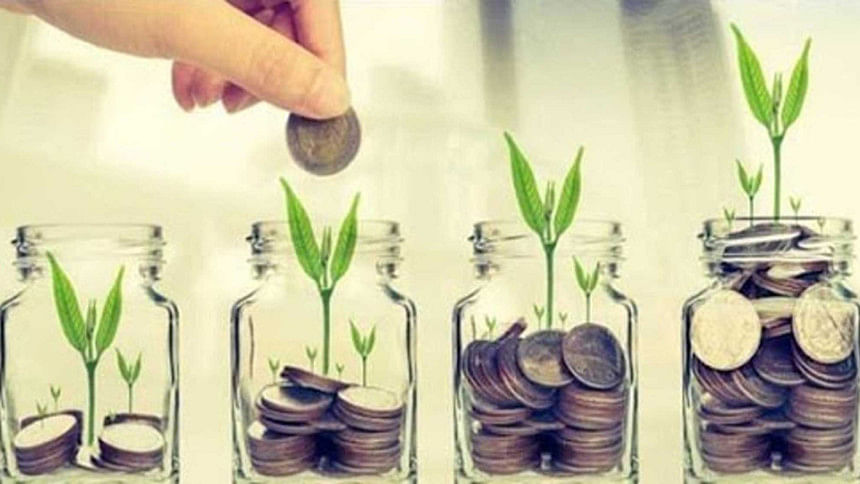Tighten your purse strings, save the planet

This is my moment of truth. When last month I got to know that there was a day called World Thrift Day (that is, today), I immediately decided I had to write about it. After all, who else would be better suited to write about thrift shopping, if not me, the person who has been shopping from Bangladesh's online "thrift" stores (more on that next week) for over a year now and could tell our readers all the ins and outs of this new, niche market?
Of course, woe became me when I realised that World Thrift Day is actually World Savings Day. Meaning that it is a day when we should all be made aware of the benefits of saving money, on personal to national levels.
Unfortunately, I am a spendthrift if I have ever seen one. I got my first proper part-time job at the age of 21 and the impulse-buying of things online (sometimes offline) began with no end in sight. Back then, I could justify my purchases, telling myself that I had always wanted that one thing but could never have asked my parents for it—it's only reasonable that I get it for myself.
So, I kept on spoiling myself and "treating" myself to all that I felt I had missed out on in my childhood and adolescence. Curiously enough, this turned out to include makeup, jewellery, coffee mugs, books that I already had PDFs of (but "oh, nothing compares to the feel of a real book"), jewellery-making tools, trinkets that are still stuffed away in random drawers, paints, canvases, and ten-too-many skirts. It seemed I had loved the film Confessions of a Shopaholic (2009), but learned the wrong lessons from it.
Only now, with my age creeping over the midway mark of my 20s, am I beginning to sober up and ponder before making impulsive purchases. Sometimes, I will wait a bit to think, before messaging a seller or popping open my purse. And while that is some progress, I am nowhere near the amount of financially responsible that I should be if I am to carry myself through my capital-p Plans for even the foreseeable future. But spending too much on things we don't need is quite a universal thing that people of all ages and backgrounds may suffer from. It is also interesting to note how we justify these impulsive purchases that often make us feel shameful and guilty.
To exemplify with an incident, a couple weeks ago, a friend and I visited Mawa ferry ghat, just to kill time and people-watch. At one point, we spotted a child blowing soap bubbles with a bubble maker she had clearly gotten from a vendor nearby. Impulse took hold of us. Our journey from "Should we get one?" to "Absolutely" to being in front of the vendor was less than a minute long. Once there, we faced a moment of indecision, but unfortunately not over the purchase of the bubble maker itself. We couldn't decide whether to get the basic one (Tk 80) or the one that came with a rattle (Tk 120). Then, my friend said the magic words, "Shokher daam lakh taka," which may translate to "there is no price too high to pay for something you desire." And we got our bubble maker, rattle and all.
However, it only took us about 10 minutes of blowing bubbles and being a spectacle for the other tourists before the less responsible of us lamented, "We really overpaid for this, you know." The other asked, "Shokher daam jeno koto?" The first sighed, "Lakh taka."
But this is how almost all our purchases go nowadays, especially online. Social media platforms such as Facebook and Instagram, and online shopping websites—despite their fair share of fraudulence—have made it so that we do not buy things we just want. More often than not, we see something on our feed and feel an intense need to possess that object now, that is, in two to five business days. Even if the "want" factor was not there before, once we see a product that is being advertised to us based on the data these online platforms have of our preferences, it becomes quite impossible to resist.
So, in this era of easy access to anything money can buy, how do we reduce waste, reuse what we already have, and recycle what we don't need so it becomes useful again?
The simple answer is to have forethought when we come across something that triggers that impulse to hit "buy". Ask yourself: Do I already own something similar to this? Will I use this more than a couple of times? Do I really need this, or even want this? Or is it just desirable in this singular moment? This will require some self-training. And if self-discipline is not your forte, ask a close friend or family member to keep you in check. Discuss a potential purchase with them before making it, and they may help you decide whether your desire is based on need or on impulse.
Another effective method would be to wait, at least a few days, before making a purchase. If you still feel the need to buy that thing after a week, then feel free to do so. This can be hard to do, especially with online businesses making all their products seem exclusive. But the flipside of late-stage capitalism is that products will only become better and our access to them, globally, will only become easier. Trust me, that thing you want will still be here a week, month, or year later—perhaps even in a wider variety of options and of better quality.
Above all, though, what is needed from all of us now is to be conscious about what we are buying. The current global culture of individualism is what has led to issues such as the climate crisis and more recently, a Covid-19 vaccine apartheid. What we all are blatantly unaware of is the reverberating impact on the world of every single thing we buy. We each think we are only one person, polluting one tiny space of the vast Earth: "Only one plastic bag is being used to pack the product I've ordered, only two people are being underpaid and overworked to create and deliver that product, only one vehicle is polluting and congesting the roads delivering my impulse buy to me."
But that's just it: we all have this mindset of removing ourselves from the rest of the world, when, in fact, a collective and consistent effort to save our world from further disaster is needed now more than ever before.
Things we buy and decide we don't need are easy for us to get rid of, but they stay in our environment for years, decades, and millennia—polluting our waters, destroying the habitats of sea creatures and killing them, and their production warming our planet closer to the dangerous point of no return. It is due to the lack of transparency in product supply chains that individual consumers must make a concerted effort to create as little waste as possible. And to be a conscious customer now is more than just about protecting our personal savings—it's about extending the lifespan of the Earth.
Afia Jahin is a member of the editorial team at The Daily Star.

 For all latest news, follow The Daily Star's Google News channel.
For all latest news, follow The Daily Star's Google News channel. 



Comments